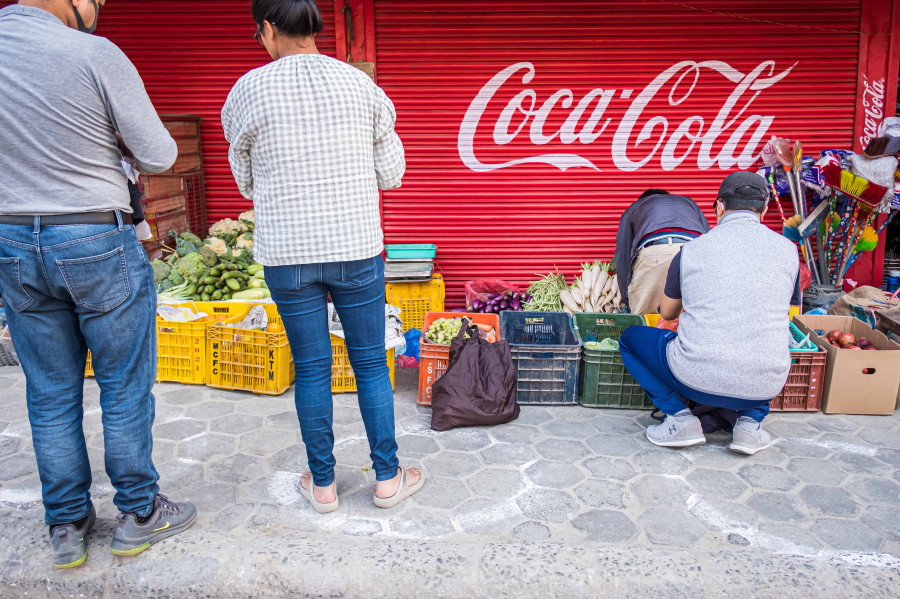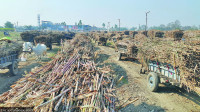Money
Retail prices of vegetables jump despite stable wholesale rates in the Valley
Prices have increased because of transportation difficulties and higher freight charges, traders say.
Krishana Prasain
Ranju Dhital went vegetable shopping on Thursday morning at a nearby grocery store, and painfully paid Rs110 for a kg of cauliflower when only a few days ago it cost her Rs50-60 per kg.
The 39-year-old housewife from Patan said that prices of fresh produce shot up right after prohibitory orders were issued in the Kathmandu Valley.
“There is nothing you can do except buy the vegetables at whatever price they charge because the shops are open for only a few hours a day. And you can't go to the vegetable market either,” she said.
Consumer rights activists complain retail prices in the valley have increased by almost twofold even though the Kalimati Fruits and Vegetable Market Development Board claims wholesale prices are stable and there is adequate supply.
The wholesale price of cauliflower local at the Kalimati Fruits and Vegetable Market on Friday was Rs50 per kg while retailers charge Rs100-110 per kg.
“Following the stay-home order, retailers have increased the price of vegetables by double compared to the wholesale price,” said Prem Lal Maharjan, president of the National Consumer Forum.
Binaya Shrestha, deputy director of the Kalimati Fruits and Vegetable Market Development Board, said that more vegetables than usual arrived at the market in the last two days.
“The market received more than 950 tonnes of vegetables each on Wednesday and Thursday. Around 250 tonnes had been delivered as of Friday afternoon. The market had been receiving around 700 tonnes of vegetables before the lockdown,” he said.
Shrestha said that the prices of most vegetables except potato had fallen recently. The wholesale and retail prices of potato have been fixed at Rs50 and Rs90-100 per kg respectively.
Tomato, which costs Rs25 per kg wholesale in Kalimati, costs Rs80-90 per kg retail. The wholesale price of cabbage is Rs50 per kg while the retail price is Rs90-100.
"Opportunist traders are taking advantage of the situation on the pretext of the prohibitory order which clearly is black marketing," Maharjan said. He added that there was no reason to raise prices as this is the vegetable season.
“A head of cauliflower for which the farmer receives Rs10 costs more than Rs100 by the time it reaches the consumer,” Maharjan said.
Traders said that retailers had been forced to jack up prices due to transportation difficulties and higher freight charges.
Last week, the Department of Commerce, Supplies and Consumer Protection conducted market inspection on the highways and caught several traders who failed to produce invoices for their inventory.
According to Maharjan, there are no representatives of the local administration and consumer rights activists in the rapid response team recently formed by the Ministry of Industry, Commerce and Supplies. "So, unless they receive a complaint, they will not look into the matter as there are no other officials in the team except a joint secretary," Maharjan said.
"The lone member of the rapid response team is busy in office work. The price of essential goods has been rising, but the rapid response team has not been able to bring it down or even control it," he said.
Shrestha said that the Kalimati market had been receiving enough quantities of vegetables amid fears that transportation will not be eased like during last year’s lockdown.
Wholesale and retail shops at the Kalimati Fruits and Vegetable Market remain open till 10 am. "But as sellers and buyers are not able to visit the market due to the prohibitory order, the place sees few people," Shrestha said.
"Truckers and traders say they are having a hard time bringing vegetables to market. Traders complain that they face problems while returning home after 10 am," Shrestha added.
"Truckers face many problems getting fresh produce from wholesalers to retailers. This discourages them transporting essential food items,” he said.
According to Shrestha, potato and onion are imported from India while seasonal vegetables are brought from different parts of the country.




 20.81°C Kathmandu
20.81°C Kathmandu













